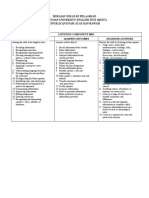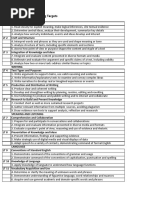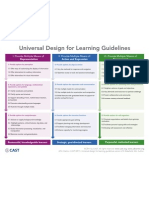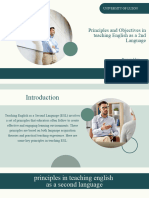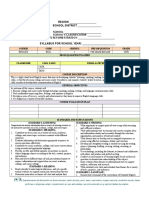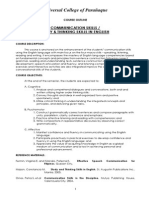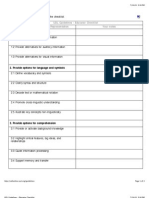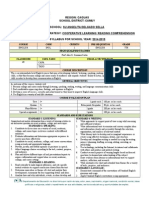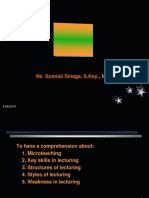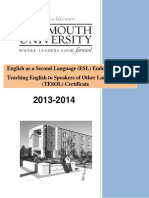Syllabus For Form 6 Muet (Lower and Upper SIXTH) 2013: Objectives
Syllabus For Form 6 Muet (Lower and Upper SIXTH) 2013: Objectives
Uploaded by
Say Beng TeohCopyright:
Available Formats
Syllabus For Form 6 Muet (Lower and Upper SIXTH) 2013: Objectives
Syllabus For Form 6 Muet (Lower and Upper SIXTH) 2013: Objectives
Uploaded by
Say Beng TeohOriginal Description:
Original Title
Copyright
Available Formats
Share this document
Did you find this document useful?
Is this content inappropriate?
Copyright:
Available Formats
Syllabus For Form 6 Muet (Lower and Upper SIXTH) 2013: Objectives
Syllabus For Form 6 Muet (Lower and Upper SIXTH) 2013: Objectives
Uploaded by
Say Beng TeohCopyright:
Available Formats
SYLLABUS FOR FORM 6 MUET (LOWER AND UPPER
SIXTH) 2013
OBJECTIVES:
To enhance students communicative competence to a level appropriate
for tertiary education,
To provide contexts for language use related to tertiary academic
experience, and
To prepare students to meet various challenges through the development
of critical thinking and the competent use of language skills
LISTENING SKILLS
1. Listening for main ideas
2. Listening for specific details
3. Note-taking
4. Paraphrasing
5. Summarizing
6. Inferencing
7. Predicting
8. Drawing conclusions
9. Identifying speakers attitudes and roles
10.Listening critically
SPEAKING SKILLS
1. Observing social conventions
2. Managing a discussion
3. Seeking and giving information
4. Expressing agreement and disagreement
5. Making suggestions or recommendations
6. Expressing and justifying viewpoints
7. Giving reasons for actions taken
8. Presenting factual information
9. Expressing opinions
10.Persuading
11.Drawing conclusions
READING COMPREHENSION SKILLS
1. Skimming and scanning
2. Deriving meaning of words from context
3. Understanding sense relationships
4. Distinguishing main ideas and supporting details
5. Distinguishing the relevant from the irrelevant
6. Distinguishing fact from opinion
7. Making inferences
8. Making hypotheses
9. Predicting outcomes
10.Drawing conclusions
1 | Page
11.Transferring information from linear to non-linear text and vice-versa
12.Paraphrasing
13.Summarizing
14.Using the skills of intertextuality
15.Reading critically
WRITING SKILLS
1. Using grammatically correct and appropriate language
2. Using a wide range of vocabulary and expression appropriate for the
intended purpose and audience
3. Using the correct mechanic
4. Generating and developing ideas for writing
5. Developing coherent and cohesive paragraphs leading to extended writing
6. Writing effective introduction
7. Writing effective conclusion
8. Defining and concepts, describing states and processes and explaining
ideas
9. Comparing and contrasting ideas, classifying information and establishing
cause and effect
10.Summarizing information
11.Responding critically and appropriately to information contained in linear
or non-linear texts
2 | Page
You might also like
- GrammarDocument14 pagesGrammarElle Bee100% (4)
- Huraian Sukatan Pelajaran Malaysian University English Test (Muet) Tingkatan Enam Atas Dan BawahDocument4 pagesHuraian Sukatan Pelajaran Malaysian University English Test (Muet) Tingkatan Enam Atas Dan BawahFeiruzie Suhana50% (2)
- Sample Research Questionnaire NaomeDocument4 pagesSample Research Questionnaire NaomeArnelfa Peligro100% (1)
- Eng Year 05 Judging Standards Assessment Pointers Web Version 1Document3 pagesEng Year 05 Judging Standards Assessment Pointers Web Version 1api-248888410No ratings yet
- Syllabus For Form 6 Muet (Lower and Upper SIXTH) 2012: ObjectivesDocument2 pagesSyllabus For Form 6 Muet (Lower and Upper SIXTH) 2012: ObjectivesJoanne SoneNo ratings yet
- Huraian Sukatan Pelajaran MuetDocument4 pagesHuraian Sukatan Pelajaran MuetMiera MijiNo ratings yet
- The Learner... The Learner(s) Can..Document5 pagesThe Learner... The Learner(s) Can..Katrin Lutao50% (2)
- Learning TargetsDocument1 pageLearning Targetsapi-262385395No ratings yet
- ENG 154 - P1 ReviewerDocument5 pagesENG 154 - P1 ReviewerRichelle Villegas100% (1)
- Representation Action and Expression EngagementDocument1 pageRepresentation Action and Expression Engagementapi-316364322No ratings yet
- Portfolio Matrix Updated 3-29-13Document3 pagesPortfolio Matrix Updated 3-29-13api-211297708No ratings yet
- STANDARD 1Document11 pagesSTANDARD 1Folake AdedejiNo ratings yet
- UQB3033 English For Academic Purposes: Pre-Requisite Semester Course Leader Office LocationDocument9 pagesUQB3033 English For Academic Purposes: Pre-Requisite Semester Course Leader Office LocationKelvin GovindarajNo ratings yet
- Updateguidelines2 0Document1 pageUpdateguidelines2 0api-193964377No ratings yet
- UDL 2 - 0 GuidelinesDocument1 pageUDL 2 - 0 GuidelinesPaul HamiltonNo ratings yet
- 8 Speech Comm Syllabus 2Document5 pages8 Speech Comm Syllabus 2jhomerzongNo ratings yet
- Principles and Objectives in Teaching EslDocument62 pagesPrinciples and Objectives in Teaching EslJames P. BacaresNo ratings yet
- Week 7 - Presentation Skills and Formative FeedbackDocument18 pagesWeek 7 - Presentation Skills and Formative FeedbackIodanutzs UkNo ratings yet
- Course Outline Hmc 4107Document13 pagesCourse Outline Hmc 4107salimbey4689No ratings yet
- Syllabus 2014 2015 10th GradeDocument3 pagesSyllabus 2014 2015 10th GradeGerardo E. Lopez MoralesNo ratings yet
- Oral communicationDocument12 pagesOral communicationlycavillamayor009No ratings yet
- Prog Soft Skill and Sommunicative EnglishDocument6 pagesProg Soft Skill and Sommunicative Englishkiran krishnaNo ratings yet
- Spoken English Syllabus Free PDFDocument3 pagesSpoken English Syllabus Free PDFshambhukumar58929No ratings yet
- Revised12th Grade SyllabusDocument4 pagesRevised12th Grade Syllabusapi-246120038No ratings yet
- Functional EnglishDocument18 pagesFunctional EnglishShehreen SyedNo ratings yet
- San Juan School Region Carolina School DistrictDocument4 pagesSan Juan School Region Carolina School DistrictGerardo E. Lopez MoralesNo ratings yet
- 9 Learning Plan OverviewDocument5 pages9 Learning Plan Overviewapi-258643060No ratings yet
- Communication, Presentation and Public SpeakingDocument3 pagesCommunication, Presentation and Public SpeakingOluwasayo JoshuaNo ratings yet
- Parent Teacher Meeting GuideDocument3 pagesParent Teacher Meeting Guidepriyankash3939No ratings yet
- Teaching SkillsDocument21 pagesTeaching SkillsAMIR HAMIDNo ratings yet
- Summary Study s2Document4 pagesSummary Study s2tabchouche.radiaNo ratings yet
- UCP - Communication Skills Study & Thinking Skills SyllabusDocument8 pagesUCP - Communication Skills Study & Thinking Skills SyllabusIanne Fabian50% (2)
- UDL Guidelines - Educator ChecklistDocument3 pagesUDL Guidelines - Educator ChecklistGreg LemoineNo ratings yet
- 7th Grade Syllabus 2014-2015Document3 pages7th Grade Syllabus 2014-2015Alex Mary GonzalezNo ratings yet
- Oral Com Q2 Mod 1Document50 pagesOral Com Q2 Mod 1Mr. ZeusNo ratings yet
- Elc Ipp English For Academic Purposes ModuleDocument7 pagesElc Ipp English For Academic Purposes ModuleEdward Tito Aguilar AncajasNo ratings yet
- Syllabus - EING 4019Document12 pagesSyllabus - EING 4019OEAENo ratings yet
- Note TSL 1054tDocument143 pagesNote TSL 1054tpipinparah95100% (3)
- Semester 1 Grade 12 SyllabusDocument5 pagesSemester 1 Grade 12 SyllabusDarryl Lee SalterNo ratings yet
- Goals, Objectives and OutcomesDocument4 pagesGoals, Objectives and OutcomesShynna TiabaNo ratings yet
- Micro Teching Final ExamDocument6 pagesMicro Teching Final ExamMustika Irjayani PanjaitanNo ratings yet
- Bahan PPT Lte Kel 7Document5 pagesBahan PPT Lte Kel 7Hendra Umar Al FaruqNo ratings yet
- Module Seven - Powerpoint HopeDocument15 pagesModule Seven - Powerpoint Hopeapi-316477782No ratings yet
- Ns. Sumiati Sinaga, S.Kep., M.KepDocument31 pagesNs. Sumiati Sinaga, S.Kep., M.KepindyputraNo ratings yet
- Week6 SpeakingDocument36 pagesWeek6 SpeakingelaltmskrNo ratings yet
- Differentiation - Conrad CurryDocument27 pagesDifferentiation - Conrad Currysatanizer100% (1)
- First Semester Fall 2021Document19 pagesFirst Semester Fall 2021hamidgujjar2676No ratings yet
- Module 6 1 EnglishDocument142 pagesModule 6 1 EnglishJeanniezyl C. CasumpangNo ratings yet
- The Danville Diploma 2012Document1 pageThe Danville Diploma 2012api-270154205No ratings yet
- Edu 348-Supervisor EvaluationDocument4 pagesEdu 348-Supervisor Evaluationapi-220195815No ratings yet
- Ell LessonDocument15 pagesEll Lessonapi-499375306No ratings yet
- Skill Based SyllabusDocument7 pagesSkill Based SyllabusAriadna López100% (2)
- Wa0050Document12 pagesWa0050rdwarakaprakashNo ratings yet
- Esl Handbook 2013 2014Document42 pagesEsl Handbook 2013 2014Caner TuranNo ratings yet
- English 10 Unit ExampleDocument2 pagesEnglish 10 Unit ExampleJordanPridemore100% (1)
- The Book of Reading and Writing: Ideas, Tips, and Lists for the Elementary ClassroomFrom EverandThe Book of Reading and Writing: Ideas, Tips, and Lists for the Elementary ClassroomNo ratings yet
- Teaching a Child with Special Needs at Home and at School: Strategies and Tools That Really Work!From EverandTeaching a Child with Special Needs at Home and at School: Strategies and Tools That Really Work!No ratings yet
- Business English: How to Succeed in the Professional WorldFrom EverandBusiness English: How to Succeed in the Professional WorldRating: 5 out of 5 stars5/5 (1)
- Outcomes Based Assessment: A Brief Guide ToDocument9 pagesOutcomes Based Assessment: A Brief Guide ToSay Beng Teoh0% (1)
- The Coat of Arms: English TranslationDocument1 pageThe Coat of Arms: English TranslationSay Beng TeohNo ratings yet
- TimesDocument1 pageTimesSay Beng TeohNo ratings yet
- Feudalism Di JepunDocument25 pagesFeudalism Di JepunSay Beng TeohNo ratings yet
- Old Lady and Her HatDocument1 pageOld Lady and Her HatSay Beng TeohNo ratings yet
- Sughee Cookies RecipeDocument1 pageSughee Cookies RecipeSay Beng TeohNo ratings yet

